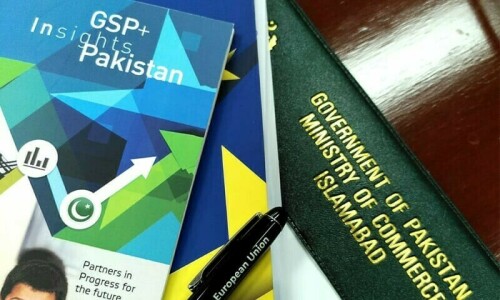THE sit-ins in Islamabad have adversely affected the growth of exports as TV screens have been flashing the event for over 45 days, giving an impression to viewers across the globe that the country is in the grip of political turmoil.
As a consequence, prospective foreign buyers started looking at other countries to ensure a smooth supply of their textile and clothing orders for the winter and spring seasons. Pakistan’s exports thus suffered a decline of 5.84pc to $3.84bn in the first two months (July-August) of the current fiscal, from $4.077bn in the same period of the last fiscal.
This was observed by Trade Development Authority of Pakistan (TDAP) Chief Executive Officer S.M. Muneer in an interview with this writer in his office at the 5th floor of the FTC Building in Karachi.
Expressing his concern over the negative growth in exports, the TDAP chief felt that it would be difficult to achieve the export target of $27bn set for this fiscal year.
Expressing his concern over the negative growth in exports, the CEO of TDAP says it will be difficult to achieve the export target of $27bn set for this fiscal year
He stated that TDAP will undoubtedly work hard, guided by commerce minister Khurram Dastgir, to achieve the target, before adding that “lots of things are not under our control”.
Responding to a question, he said if there had been no GSP Plus status for Pakistani exports to the European Union (EU), the negative impact on exports would have been more severe. Due to this concession, Pakistan’s exports managed to grow 2.75pc, with earnings going up to $25bn in FY14, from $24.5bn in the previous year.
The rupee’s devaluation, S.M. Muneer agreed, did benefit exports for a short period, but the whole economy suffered because it pushed up the cost of living. It was encouraging to note that the government managed to revalue the rupee in the range of 98 to 100 to a dollar from 106 to a dollar. But the sit-ins once again brought pressure on the local currency,bringing down its value to around 103 to a dollar.
He said floods had a negligible impact on exports because they mostly affected rural areas and not big cities (urban areas). However, the government’s quick response minimised the losses in villages, which are the primary source of industrial raw materials. Contrary to initial estimates, the final cotton crop turned out to be not so bad.
After taking stock of the current political situation, the TDAP chief postponed the annual mega Expo Pakistan 2014 event scheduled for October 22-26. The decision was also taken after receiving advice from Pakistan’s foreign missions, which suggested that buyers may not be comfortable visiting the country under this situation.
For promotion of exports, Muneer disclosed that around 12 exhibitions will be held in the UAE over the next six months, and trade fairs will also be organised in the US, Europe and some other Asian countries during the current fiscal.
Referring to the lifestyle exhibition ‘Aalishan Pakistan’ held in New Delhi last month, he said the event — which included a collection of top Pakistani brands and designers — was a true showcase of a progressive Pakistan.
More than 135 exhibitors with 270 stalls showcased their products, and the event generated business of around $15m, along with ‘ future prospects’ deals valued at $20-25m signed during the business-to-business (B2B) meetings.
The TDAP chief executive stressed upon the need for strengthening trade relations between the two countries, saying that politics should be separated from business. Only then can India and Pakistan move forward on the business front. There is an urgent need to promote regional trade among the eight-nation South Asian Association for Regional Cooperation, which currently stands at $6.7bn only.
In the EU, around 70pc of the trade takes place among the 28 member states. By contrast, Saarc countries prefer others over their neighbours for trade.
He pointed out that if India and China can deepen trade to around $100bn despite their history of confrontation, Pakistan and India’s reluctance to expand bilateral trade from the current meagre level of $3bn (with $2.5bn imports from and $500bn exports to India) was not realistic.
Published in Dawn, Economic & Business, October 6th, 2014















































Dear visitor, the comments section is undergoing an overhaul and will return soon.